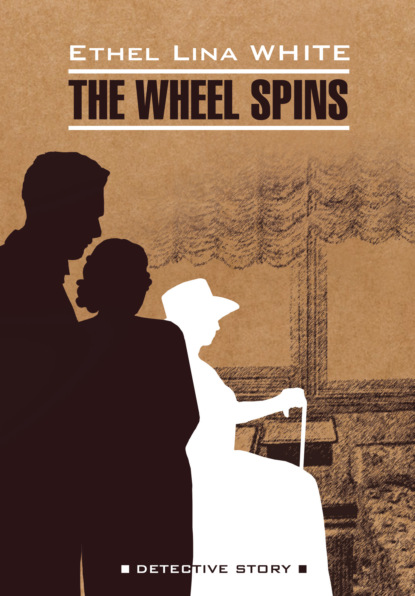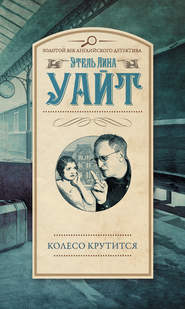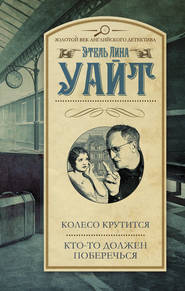По всем вопросам обращайтесь на: info@litportal.ru
(©) 2003-2025.
✖
Колесо крутится. Леди исчезает / The Wheel Spins. The Lady Vanishe
Настройки чтения
Размер шрифта
Высота строк
Поля
She was speaking in a low voice, which was vehement in spite of its muffled tone.
“No darling. Not another day. Not even for you. We’ve stayed too—”
Iris lost the rest of the sentence. She prepared to follow them at a discreet distance, for she had become acutely aware of her own wrecked appearance.
The arrival of the honeymoon pair had restored her sense of values. Their presence was proof that the hotel was not far away, for they never walked any distance. At the knowledge, the mountains shrank back to camera-subjects, while she was reconstructed, from a lost entity, to a London girl who was critical about the cut of her shorts.
Very soon she recognised the original shrine, whence she had deserted the pass. Limping painfully down the track, presently she caught the gleam of the darkening lake and the lights of the hotel, shining through the green gloom.
She began to think again of a hot bath and dinner as she remembered that she was both tired and hungry.
But although apparently only the physical traces of her adventure remained, actually, her sense of security had been assailed – as if the experience were a threat from the future, to reveal the horror of helplessness, far away from all that was familiar.
Chapter three. Conversation piece
When the honeymoon pair returned to the hotel the four remaining guests were sitting outside on the gravelled square, before the veranda. They were enjoying the restful interlude of “between the lights.” It was too dark to write letters, or read – too early to dress for dinner. Empty cups and cake crumbs on one of the tables showed that they had taken afternoon tea in the open and had not moved since.
It was typical of two of them, the Misses Flood-Porter, to settle. They were not the kind that flitted, being in the fifties and definitely set in their figures and their habits. Both had immaculately waved grey hair, which retained sufficient samples of the original tint to give them the courtesy-title of blondes. They had also, in common, excellent natural complexions and rather fierce expressions.
The delicate skin of the elder – Miss Evelyn – was slightly shrivelled, for she was nearly sixty, while Miss Rose was only just out of the forties. The younger sister was taller and stouter; her voice was louder, her colour deeper. In an otherwise excellent character, was a streak of amiable bully, which made her inclined to scold her partner at contract.
During their visit, they had formed a quartette with the Reverend Kenneth Barnes and his wife. They had travelled out on the same train, and they planned to return to England together. The vicar and his wife had the gift of pleasant companionship, which the Misses Flood-Porter – who were without it – attributed to mutual tastes and prejudices.
The courtyard was furnished with iron chairs and tables, enamelled in brilliant colours, and was decorated with tubs of dusty evergreen shrubs. As Miss Flood-Porter looked round her, she thought of her own delightful home in a Cathedral city.
According to the papers, there had been rain in England, so the garden should look its best, with vivid green grass and lush borders of asters and dahlias.
“I’m looking forward to seeing my garden again,” she said.
“Ours,” corrected her sister, who was John Blunt.
“And I’m looking forward to a comfortable chair,” laughed the vicar. “Ha. Here comes the bridal pair.”
In spite of a sympathetic interest in his fellows he did not call out a genial greeting. He had learned from his first – and final – rebuff that they had resented any intrusion on their privacy. So he leaned back, puffing at his pipe, while he watched them mount the steps of the veranda.
“Handsome pair,” he said in an approving voice.
“I wonder who they really are,” remarked Miss Flood-Porter. “The man’s face is familiar to me. I know I’ve seen him somewhere.”
“On the pictures, perhaps,” suggested her sister.
“Oh, do you go?” broke in Mrs. Barnes eagerly, hoping to claim another taste in common, for she concealed a guilty passion for the cinema.
“Only to see George Arliss and Diana Wynyard,” explained Miss Flood-Porter.
“That settles it,” said the vicar. “He’s certainly not George Arliss, and neither is she Diana.”
“All the same, I feel certain there is some mystery about them,” persisted Miss Flood-Porter.
“So do I,” agreed Mrs. Barnes. “I–I wonder if they are really married.”
“Are you?” asked her husband quickly.
He laughed gently when his wife flushed to her eyes.
“Sorry to startle you, my dear,” he said, “but isn’t it simpler to believe that we are all of us what we assume to be? Even parsons and their wives.” He knocked the ashes out of his pipe, and rose from his chair. “I think I’ll stroll down to the village for a chat with my friends.”
“How can he talk to them when he doesn’t know their language?” demanded Miss Rose bluntly, when the vicar had gone from the garden.
“Oh, he makes them understand,” explained his wife proudly. “Sympathy, you know, and common humanity. He’d rub noses with a savage.”
“I’m afraid we drove him away by talking scandal,” said Miss Flood-Porter.
“It was my fault,” declared Mrs. Barnes. “I know people think I’m curious. But, really, I have to force myself to show an interest in my neighbour’s affairs. It’s my protest against our terrible national shyness.”
“But we’re proud of that,” broke in Miss Rose. “England does not need to advertise.”
“Of course not… But we only pass this way once. I have to remind myself that the stranger sitting beside me may be in some trouble and that I might be able to help.”
The sisters looked at her with approval. She was a slender woman in the mid-forties, with a pale oval face, dark hair, and a sweet expression. Her large brown eyes were both kind and frank – her manner sincere.
It was impossible to connect her with anything but rigid honesty. They knew that she floundered into awkward explanations, rather than run the risk of giving a false impression.
In her turn, she liked the sisters. They were of solid worth and sound respectability. One felt that they would serve on juries with distinction, and do their duty to their God and their neighbour – while permitting no direction as to its nature.
They were also leisured people, with a charming house and garden, well-trained maids and frozen assets in the bank. Mrs. Barnes knew this, so, being human, it gave her a feeling of superiority to reflect that the one man in their party was her husband.
She could appreciate the sense of ownership, because, up to her fortieth birthday, she had gone on her yearly holiday in the company of a huddle of other spinsters. Since she had left school, she had earned her living by teaching, until the miracle happened which gave her – not only a husband – but a son.
Both she and her husband were so wrapped up in the child that the vicar sometimes feared that their devotion was tempting Fate. The night before they set out on their holiday he proposed a pact.
“Yes,” he agreed, looking down at the sleeping boy in his cot. “He is beautiful. But… It is my privilege to read the Commandments to others. Sometimes, I wonder—”
“I know what you mean,” interrupted his wife. “Idolatry.”
He nodded.
“I am as guilty as you,” he admitted. “So I mean to discipline myself. In our position, we have special opportunities to influence others. We must not grow lop-sided, but develop every part of our nature. If this holiday is to do us real good, it must be a complete mental change… My dear, suppose we agree not to talk exclusively of Gabriel, while we are away?”
Mrs. Barnes agreed. But her promise did not prevent her from thinking of him continually. Although they had left him in the care of a competent grandmother, she was foolishly apprehensive about his health.
While she was counting the remaining hours before her return to her son, and Miss Flood-Porter smiled in anticipation of seeing her garden, Miss Rose was pursuing her original train of thought. She always ploughed a straight furrow, right to its end.
“I can’t understand how any one can tell a lie,” she declared. “Unless, perhaps, some poor devil who’s afraid of being sacked. But – people like us. We know a wealthy woman who boasts of making false declarations at the Customs. Sheer dishonesty.”
As she spoke, Iris appeared at the gate of the hotel garden. She did her best to skirt the group at the table, but she could not avoid hearing what was said.
“Perhaps I should not judge others,” remarked Mrs. Barnes in the clear carrying voice of a form-mistress. “I’ve never felt the slightest temptation to tell a lie.”
“No darling. Not another day. Not even for you. We’ve stayed too—”
Iris lost the rest of the sentence. She prepared to follow them at a discreet distance, for she had become acutely aware of her own wrecked appearance.
The arrival of the honeymoon pair had restored her sense of values. Their presence was proof that the hotel was not far away, for they never walked any distance. At the knowledge, the mountains shrank back to camera-subjects, while she was reconstructed, from a lost entity, to a London girl who was critical about the cut of her shorts.
Very soon she recognised the original shrine, whence she had deserted the pass. Limping painfully down the track, presently she caught the gleam of the darkening lake and the lights of the hotel, shining through the green gloom.
She began to think again of a hot bath and dinner as she remembered that she was both tired and hungry.
But although apparently only the physical traces of her adventure remained, actually, her sense of security had been assailed – as if the experience were a threat from the future, to reveal the horror of helplessness, far away from all that was familiar.
Chapter three. Conversation piece
When the honeymoon pair returned to the hotel the four remaining guests were sitting outside on the gravelled square, before the veranda. They were enjoying the restful interlude of “between the lights.” It was too dark to write letters, or read – too early to dress for dinner. Empty cups and cake crumbs on one of the tables showed that they had taken afternoon tea in the open and had not moved since.
It was typical of two of them, the Misses Flood-Porter, to settle. They were not the kind that flitted, being in the fifties and definitely set in their figures and their habits. Both had immaculately waved grey hair, which retained sufficient samples of the original tint to give them the courtesy-title of blondes. They had also, in common, excellent natural complexions and rather fierce expressions.
The delicate skin of the elder – Miss Evelyn – was slightly shrivelled, for she was nearly sixty, while Miss Rose was only just out of the forties. The younger sister was taller and stouter; her voice was louder, her colour deeper. In an otherwise excellent character, was a streak of amiable bully, which made her inclined to scold her partner at contract.
During their visit, they had formed a quartette with the Reverend Kenneth Barnes and his wife. They had travelled out on the same train, and they planned to return to England together. The vicar and his wife had the gift of pleasant companionship, which the Misses Flood-Porter – who were without it – attributed to mutual tastes and prejudices.
The courtyard was furnished with iron chairs and tables, enamelled in brilliant colours, and was decorated with tubs of dusty evergreen shrubs. As Miss Flood-Porter looked round her, she thought of her own delightful home in a Cathedral city.
According to the papers, there had been rain in England, so the garden should look its best, with vivid green grass and lush borders of asters and dahlias.
“I’m looking forward to seeing my garden again,” she said.
“Ours,” corrected her sister, who was John Blunt.
“And I’m looking forward to a comfortable chair,” laughed the vicar. “Ha. Here comes the bridal pair.”
In spite of a sympathetic interest in his fellows he did not call out a genial greeting. He had learned from his first – and final – rebuff that they had resented any intrusion on their privacy. So he leaned back, puffing at his pipe, while he watched them mount the steps of the veranda.
“Handsome pair,” he said in an approving voice.
“I wonder who they really are,” remarked Miss Flood-Porter. “The man’s face is familiar to me. I know I’ve seen him somewhere.”
“On the pictures, perhaps,” suggested her sister.
“Oh, do you go?” broke in Mrs. Barnes eagerly, hoping to claim another taste in common, for she concealed a guilty passion for the cinema.
“Only to see George Arliss and Diana Wynyard,” explained Miss Flood-Porter.
“That settles it,” said the vicar. “He’s certainly not George Arliss, and neither is she Diana.”
“All the same, I feel certain there is some mystery about them,” persisted Miss Flood-Porter.
“So do I,” agreed Mrs. Barnes. “I–I wonder if they are really married.”
“Are you?” asked her husband quickly.
He laughed gently when his wife flushed to her eyes.
“Sorry to startle you, my dear,” he said, “but isn’t it simpler to believe that we are all of us what we assume to be? Even parsons and their wives.” He knocked the ashes out of his pipe, and rose from his chair. “I think I’ll stroll down to the village for a chat with my friends.”
“How can he talk to them when he doesn’t know their language?” demanded Miss Rose bluntly, when the vicar had gone from the garden.
“Oh, he makes them understand,” explained his wife proudly. “Sympathy, you know, and common humanity. He’d rub noses with a savage.”
“I’m afraid we drove him away by talking scandal,” said Miss Flood-Porter.
“It was my fault,” declared Mrs. Barnes. “I know people think I’m curious. But, really, I have to force myself to show an interest in my neighbour’s affairs. It’s my protest against our terrible national shyness.”
“But we’re proud of that,” broke in Miss Rose. “England does not need to advertise.”
“Of course not… But we only pass this way once. I have to remind myself that the stranger sitting beside me may be in some trouble and that I might be able to help.”
The sisters looked at her with approval. She was a slender woman in the mid-forties, with a pale oval face, dark hair, and a sweet expression. Her large brown eyes were both kind and frank – her manner sincere.
It was impossible to connect her with anything but rigid honesty. They knew that she floundered into awkward explanations, rather than run the risk of giving a false impression.
In her turn, she liked the sisters. They were of solid worth and sound respectability. One felt that they would serve on juries with distinction, and do their duty to their God and their neighbour – while permitting no direction as to its nature.
They were also leisured people, with a charming house and garden, well-trained maids and frozen assets in the bank. Mrs. Barnes knew this, so, being human, it gave her a feeling of superiority to reflect that the one man in their party was her husband.
She could appreciate the sense of ownership, because, up to her fortieth birthday, she had gone on her yearly holiday in the company of a huddle of other spinsters. Since she had left school, she had earned her living by teaching, until the miracle happened which gave her – not only a husband – but a son.
Both she and her husband were so wrapped up in the child that the vicar sometimes feared that their devotion was tempting Fate. The night before they set out on their holiday he proposed a pact.
“Yes,” he agreed, looking down at the sleeping boy in his cot. “He is beautiful. But… It is my privilege to read the Commandments to others. Sometimes, I wonder—”
“I know what you mean,” interrupted his wife. “Idolatry.”
He nodded.
“I am as guilty as you,” he admitted. “So I mean to discipline myself. In our position, we have special opportunities to influence others. We must not grow lop-sided, but develop every part of our nature. If this holiday is to do us real good, it must be a complete mental change… My dear, suppose we agree not to talk exclusively of Gabriel, while we are away?”
Mrs. Barnes agreed. But her promise did not prevent her from thinking of him continually. Although they had left him in the care of a competent grandmother, she was foolishly apprehensive about his health.
While she was counting the remaining hours before her return to her son, and Miss Flood-Porter smiled in anticipation of seeing her garden, Miss Rose was pursuing her original train of thought. She always ploughed a straight furrow, right to its end.
“I can’t understand how any one can tell a lie,” she declared. “Unless, perhaps, some poor devil who’s afraid of being sacked. But – people like us. We know a wealthy woman who boasts of making false declarations at the Customs. Sheer dishonesty.”
As she spoke, Iris appeared at the gate of the hotel garden. She did her best to skirt the group at the table, but she could not avoid hearing what was said.
“Perhaps I should not judge others,” remarked Mrs. Barnes in the clear carrying voice of a form-mistress. “I’ve never felt the slightest temptation to tell a lie.”









